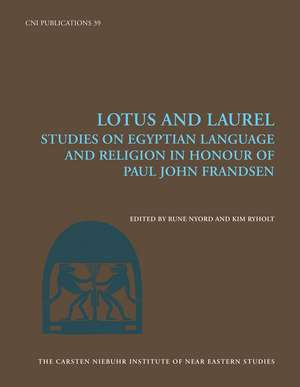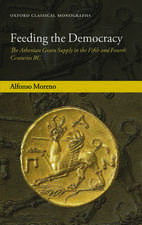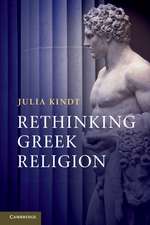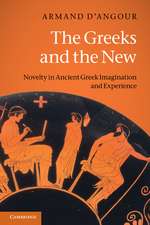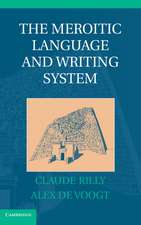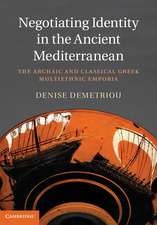Lotus and Laurel: Studies on Egyptian Language and Religion (in Honour of Paul John Frandsen)
Editat de Rune Nyord, Kim Ryholten Limba Engleză Hardback – 15 dec 2015
Lotus and Laurel brings together a wealth of essays in celebration of Paul John Frandsen, who has led a distinguished career as a scholar of ancient Egyptian language and religion. The contributors are friends, colleagues, or former students, and all are leading authorities in Egyptology. Evoking his wide range of interests, they touch on a breadth of topics, including religious thought and representation; social questions of gender, kinship, and temple slavery; as well as studies of grammar and etymology. More than a tribute to this important scholar in Egyptology, Lotus and Laurel is a window into some of the most important work going on now in the field.
Preț: 464.48 lei
Preț vechi: 563.52 lei
-18% Nou
Puncte Express: 697
Preț estimativ în valută:
88.88€ • 92.79$ • 73.56£
88.88€ • 92.79$ • 73.56£
Carte disponibilă
Livrare economică 14-28 martie
Preluare comenzi: 021 569.72.76
Specificații
ISBN-13: 9788763542081
ISBN-10: 8763542080
Pagini: 521
Ilustrații: 27 color plates, 47 halftones, 7 line drawings, 11 tables
Dimensiuni: 162 x 238 x 43 mm
Greutate: 1.31 kg
Editura: Museum Tusculanum Press
Colecția Museum Tusculanum Press
ISBN-10: 8763542080
Pagini: 521
Ilustrații: 27 color plates, 47 halftones, 7 line drawings, 11 tables
Dimensiuni: 162 x 238 x 43 mm
Greutate: 1.31 kg
Editura: Museum Tusculanum Press
Colecția Museum Tusculanum Press
Notă biografică
Rune Nyord is the Lady Wallis Budge Fellow at Christ’s College, Cambridge, and author of Breathing Flesh, also published by Museum Tusculanum Press. Kim Ryholt is professor of Egyptology at the University of Copenhagen. He is the author of The Political Situation in Egypt During the Second Intermediate Period C. 1800–1550 B. C. and Narrative Literature from the Tebtunis Temple Library, both also published by Museum Tusculanum Press.
Cuprins
Preface
Bibliography for Paul John Frandsen
Tine Bagh
Sobek Crowned
John Baines
The Self-representation of Pepyankh the Middle at Meir: Scandal, religious institutions and participation, the next world
Ewards Brovarski
Petrie’s pelta palettes
Mette Gregersen
Spend an Optimal day (i?ri? hrw nfr)
Fredrik Hagen
Hieratic ostraca in the National Museum, Copenhagen
Ole Herslund
On the pictorial meaning of the drop-shaped hieroglyph for ‘copper’ from the archaic period to the Middle Kingdom
Friedhelm Hoffmann
XX und XY. Oder: Der kleine Unterschied und woher er nach ägyptischer Vorstellung kommt
Jens Blach Jørgensen
Myths, menarche and the Return of the Goddess
Mogens Jørgensen
The quest for immortality: Reflections on some Egyptian ‘portraits’ in the Ny Carlsberg Glyptotek
Alexandra von Lieven
Antisocial gods? On the transgresstion of norms in ancient Egyptian mythology
Lise Manniche
‘Bes’ rooms
Saphinaz-Amal Naguib
Translating the ancient Egyptian worldview in museums
Rune Nyord
Conceptualizations of embodied space: The semantics of body parts in Sahidic compound prepositions
Tage Petersen
Where did the Way of Hermes lead? One constructing the cosmology of Corpus Hermeticumd—studying texts without a context
Jørgen Podemann Sørensen
On Intercession
Joachim Friedrich Quack
DIE Geburt eines Gottes?
Kim Ryholt
A self-dedication addressed to Anubis: Divine protection against malevolent forces or forced labor?
Rana Sérida
Cultural memory and motifs of magician heroes from ancient to Islamic Egypt
David P. Silverman
The w??? amulet of feldspar and its implicit and explicit wish
John Tait
May Pharaoh listen to the story! Stories-within-stories in Demotic fictional narrative
Lana Troy
How to treat a lady: Reflections on the ‘notorious’ P. Leiden I 371
Pascal Vernus
La racine √gm, notion de ‘rencontre, contact avec’, et ses radicaus derives (gm?, ngmgm et gmgm)
David A. Warburton
The syntax of possession
Harco Willems
Family life in the hereafter according to Coffin Texts spells 131-146: A study in the structure of ancient Egyptian domestic groups
Karl-Theodor Zauzich
Einige mutige Etymologien
Plates
Bibliography for Paul John Frandsen
Tine Bagh
Sobek Crowned
John Baines
The Self-representation of Pepyankh the Middle at Meir: Scandal, religious institutions and participation, the next world
Ewards Brovarski
Petrie’s pelta palettes
Mette Gregersen
Spend an Optimal day (i?ri? hrw nfr)
Fredrik Hagen
Hieratic ostraca in the National Museum, Copenhagen
Ole Herslund
On the pictorial meaning of the drop-shaped hieroglyph for ‘copper’ from the archaic period to the Middle Kingdom
Friedhelm Hoffmann
XX und XY. Oder: Der kleine Unterschied und woher er nach ägyptischer Vorstellung kommt
Jens Blach Jørgensen
Myths, menarche and the Return of the Goddess
Mogens Jørgensen
The quest for immortality: Reflections on some Egyptian ‘portraits’ in the Ny Carlsberg Glyptotek
Alexandra von Lieven
Antisocial gods? On the transgresstion of norms in ancient Egyptian mythology
Lise Manniche
‘Bes’ rooms
Saphinaz-Amal Naguib
Translating the ancient Egyptian worldview in museums
Rune Nyord
Conceptualizations of embodied space: The semantics of body parts in Sahidic compound prepositions
Tage Petersen
Where did the Way of Hermes lead? One constructing the cosmology of Corpus Hermeticumd—studying texts without a context
Jørgen Podemann Sørensen
On Intercession
Joachim Friedrich Quack
DIE Geburt eines Gottes?
Kim Ryholt
A self-dedication addressed to Anubis: Divine protection against malevolent forces or forced labor?
Rana Sérida
Cultural memory and motifs of magician heroes from ancient to Islamic Egypt
David P. Silverman
The w??? amulet of feldspar and its implicit and explicit wish
John Tait
May Pharaoh listen to the story! Stories-within-stories in Demotic fictional narrative
Lana Troy
How to treat a lady: Reflections on the ‘notorious’ P. Leiden I 371
Pascal Vernus
La racine √gm, notion de ‘rencontre, contact avec’, et ses radicaus derives (gm?, ngmgm et gmgm)
David A. Warburton
The syntax of possession
Harco Willems
Family life in the hereafter according to Coffin Texts spells 131-146: A study in the structure of ancient Egyptian domestic groups
Karl-Theodor Zauzich
Einige mutige Etymologien
Plates
